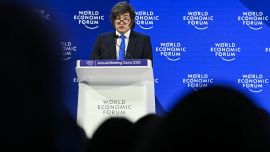Donald Trump’s victory in the United States election has created a scenario of conflicting expectations among Argentina’s business leaders.
The US president-elect’s political affinity with President Javier Milei has enthused businessmen, who envisage their relationship will serve as an acceleration of their country’s reinsertion into the world. Yet they are also worried by Trump's planned economic restructuring of the United States and a new form of US protectionism that would be in competition with some sectors of the local economy.
Company owners, sector leaders and local analysts highlight the importance of the Western alignment proposed by Milei since the start of his Presidency in the framework of Argentina’s return to international markets.
“If he gets the support of Trump, the country can seal a deal with the International Monetary Fund to permit a faster exit from the ‘cepo’ [currency controls], which is the gateway to investments, after which the legal conditions for doing business can be set,” one source in the business community told Perfil.
Representatives from the domestic private sector has requested the design of a strategy “complementary to the protectionist economic plan of Trump,” thus avoiding a competition between products.
The resurgence of bilateral or regional trade agreements (like the frustrated Free Trade Area of the Americas, or ALCA in its Spanish acronym) is starting to look like a concrete agenda after learning the electoral results of the North American giant.
The geopolitical and commercial dispute between the United States and China could also be a “window of opportunity” for Argentina.
The positive view
“The affinity between President Javier Milei and Donald Trump was always clear. In that context Trump’s triumph could mean a different era for Argentina,” said Cámara Argentina de Comercio y Servicios (CAC) President Mario Grinman in an interview.
“We’ll wait a few days and see the reaction of the markets, which is the best thermometer. I’m optimistic,” Grinman told Perfil, ratifying his organisation’s preference for “being able to trade with the whole world.”
He admitted, however, that “in the framework of Mercosur, there are limitations.”
Grinman considered: “Today’s commercial relations are not decided by diplomacy but by the affinity between presidents. We shall see.”
Within CAC, trade unions and businesses converge with technological enterprises – one of the sectors most promoted by the libertarian administration on the basis of the links maintained by the President with billionaire SpaceX, Tesla and X owner Elon Musk.
Unión Industrial Argentina (UIA) President Daniel Funes de Rioja, presents the situation as less dramatic for a local manufacturing sector fearing a negative impact from the closure of trade frontiers which might be imposed by the reindustrialisation of the United States.
“Bearing in mind the prevailing trends towards nearshoring and friendshoring, it seems to me that interesting opportunities are opening up for Argentina and the region on the commercial front,” the industrial leader told Perfil.
He also claimed that “independently of that, the agreement between Mercosur and the European Union postponed so many times might also be defined.”
Political support, commercial uncertainty?
AmCham CEO Alejandro Díaz pointed out the potential for stronger political support.
“Based on the foreign policy experience of his previous government and his affinity with the current Argentine president, we might induce that the political support could be greater than from a Democratic administration,” said Díaz, highlighting their “common vision and political alignment.”
He warned, however, that “the protectionism to be imposed by Trump’s future administration could affect the export of products from Argentina with steel, aluminium and biofuels as previous examples.”
By contrast, “with multilateral credit organisations, the support will be maintained very positively,” Díaz told Perfil.
Dante Sica, Production Minister in the 2015-2019 Mauricio Macri administration and founder of ABECEB consultancy firm, affirmed that “Argentina should also be a beacon for the region and a balance in foreign policy.”
“If the United States closes shop and wishes to attract investments, that might compete with some segments in Argentina but not all of them,” he continued.
“While Argentina and the United States have competing productive structures because we produce similar things, the United States lacks copper so mining investments will continue coming to Argentina – at most we’ll compete with Peru or with Chile,” Sica concluded.


















Comments